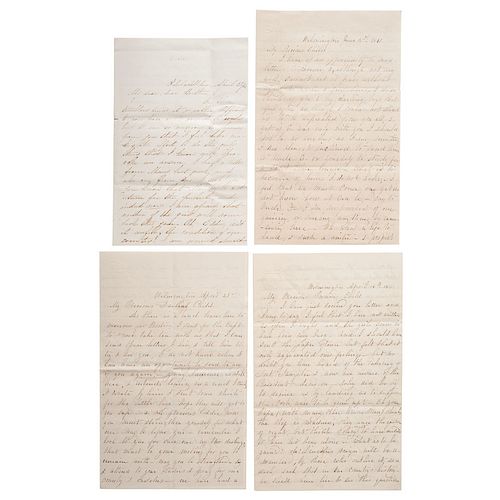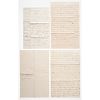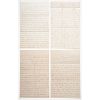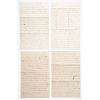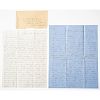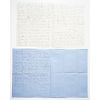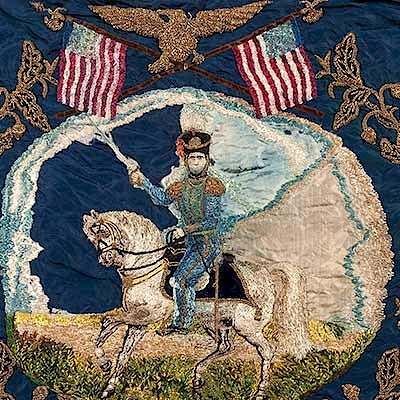Harvard Student Edward Hartwell Kidder Civil War Archive, Incl. Letters from his Family in Wilmington, NC, 1861-1863
About Seller
6270 Este Ave.
Cincinnati , OH 45232
United States
With offices in Cincinnati, Cleveland and Denver, Cowan’s holds over 40 auctions each year, with annual sales exceeding $16M. We reach buyers around the globe, and take pride in our reputation for integrity, customer service and great results. A full-service house, Cowan’s Auctions specializes in Am...Read more
Two ways to bid:
- Leave a max absentee bid and the platform will bid on your behalf up to your maximum bid during the live auction.
- Bid live during the auction and your bids will be submitted real-time to the auctioneer.
Bid Increments
| Price | Bid Increment |
|---|---|
| $0 | $25 |
| $500 | $50 |
| $1,000 | $100 |
| $2,000 | $250 |
| $5,000 | $500 |
| $10,000 | $1,000 |
| $20,000 | $2,500 |
| $50,000 | $5,000 |
| $100,000 | $10,000 |
About Auction
Oct 31, 2018
Cowan's is honored to present the Magnificent Sword Collection of William Koch in its two-day firearms, militaria, and American history auction. Cowan's Auctions dawnie@cowans.com
- Lot Description
Harvard Student Edward Hartwell Kidder Civil War Archive, Incl. Letters from his Family in Wilmington, NC, 1861-1863
Lot of 10 letters from Edward Hartwell Kidder's Southern family including one from a captain of a blockade runner.
Edward Hartwell Kidder (1840-1921) was a Southerner who led a dual life. He was born in the north, but raised in the south. As a young boy he spent his summers in the north. At the age of 13 he was sent to a Massachusetts school run by Harvard graduate Stephen Weld. Accepted to Harvard in 1859, he seems to be the only Southerner who actually remained and graduated from the college during the Civil War. Meanwhile, his brother George was busy fighting for the south. The men Harvard put into the field were working to squash the rebellion. At Harvard Kidder was a member of the Delta Psi fraternity and the Hasty Pudding Club. Later in life he became a successful businessman, respected church elder and trustee for several charitable organizations. A member of Manhattan's social elite, he counted among his friends a former vice president and numerous politicians. In 1902 his name was thrust into the national spotlight when he became entangled in his son-in-law's (Paul Leicester Ford) murder. The victim met his fate at the hands of his own brother (Malcolm Webster Ford) and Kidder refused to cooperate with authorities even though he was the first on the scene along with a physician from next door. His life was indeed full of envy, mystery and intrigue.
The archive includes:
1. 4pp, 8vo, written by his mother, Anne (Potter) Kidder, Wilmington [NC], Mar. 8, 1861. Reading in part: " I received your letters from Stockbridge, [MA] and Cambridge and was glad to hear directly from the little boys. Gil was glad to hear... from the little boys...he was delighted to see you & with the candy. Gil says 'tell Popy the boys thought it the best candy they ever ate & one boy says tell that black woman if she will make me some of that candy I will pay the express. Well says Polly 'if he is a Black Republican I aint a going too, but if he is not why then I will.' So you see Polly has some idea of the cause of our troubles. You wish me to send some wine. The vessel left yesterday with your box...I rec. your letter just in time to get more and put [it] on board. She did not leave until three in the afternoon...tell him I reckon we were more disappointed at his not coming than he was himself. The servants spoke of it with regret. You say you cannot judge anything about our state from the papers. Well the feeling now with the Union men is that we hope not to secede, but the Secessionists say, we must, we will have too. Our governor was down a few days ago & made a very exciting speech saying the state should not be disgrace[d] in his hands & wished any effort [be] made to get a convention & then gain the desired end somehow. So you see our peace congress has done nothing. Mr. Davis was riding with me the day after Mr. D. came from Washington & spoke of his being completely disheartened & although he does not own that he is a Secessionist...he made a speech to a crowded house...amidst the constant applause of all, but the Secessionists...he is our favorite speaker and his opinion influences many that were determined no to change....A.K ."
Just days after the bombardment of Fort Sumter, three family members all wrote letters to him - his father, mother and sister, Sue.
2. 2pp, 4to, written by his father, Edward Kidder, Wilmington [NC], Apr. 16, 1861. In part: " I write this with a heavy hand...we have no prospects but war. We must prepare for the worst. I suppose the Govr. will convene the Legislature very soon when they will call a convention & vote this state out of the Union. Three or 4 companies went down to the forts today to take possession fearing the Federal troops would come & possess them. Most of the soldiers are quite young & I fear will find it pretty hard. We have organized two companies for home protection composed of those not liable to military duty. Also, one company of horse which I shall join. The fort I fear is not in very good condition & if any considerable attack was made might have to be evacuated...they will soon put it in order, but it is not bomb proof. Poor Joe Wright I saw him in the ranks yesterday - can hardly speak...Charleston is under blockade & we expect to be soon...all business is at a stand. Property is of no account but we must make the best of it. It may be necessary for you to come home but of that I will give you due notice. I should dislike to have you leave very much as it would completely upset a regular education...E. Kidder ."
3. 4pp, 8vo, written by his mother, Anne, Wilmington [NC], Apr. 16, 1861. "... No doubt you have heard of the taking of Fort Sumpter & now are aware of the President's decision. Why did he try to deceive us by leading us to suppose the forts were to be given up? your Pap (with many other Union men) think the step is madness. They wave the question of right, but...policy ought to have decided to have let them alone. What is to be gained? Oh! Lincoln's reign will be remembered ...as a dark, dark spot in our country's history...I have no doubts...that the north will, in the end, overcome the south, but then? Will it be a united people? No never. The north have more men & money therefore they probably will gain the victory, but it will be through seas of blood. Oh my child if you & our darling Georgia was decided Christians I should feel differently for then I should feel that I could give you up...you better remain where you are for the present...remember try & keep as quiet as you can...two of our companies, besides a German company have started to take our forts. Poor fellows they passed here this morning...some looked much whiter than usual. Our fort is in dilapidated condition & I fear a weak affair to resist a strong enemy. Oh, cannot this thing be stopped? Can nothing be done? The negroes are anxious to know what it all means, conscious of being the just cause. I think I hear [Wendell] Phillips disapproving of war. Why have so many been working for years to gain this end? Could not their pretended object been accomplished in a more Christian manner. Oh, New England has much to think of...now we do not know what to do...we must try & look to God for help...may God watch over us all & let us see better days or strengthen us for what is before us... your affect. mother, A.K ."
4. 2pp, 8vo, written by Sue Kidder, Wilmington, NC, April 16 [1861]. In part: " I do want to see you very much, but I am so glad you are not home now. Everything is sad & exciting and seems to me I should have been about crazy if you and G. were home and members of our military companies....they are all ordered soon to Fort Casewell and yesterday they started. The town seems almost desolate ...nearly all of the young men belonged to the L. infantry. No one knows how long they are going to stay... Arney [?] came up Monday to tell em goodbye, but I did not feel at all well that day and was excused from all company though I should have seen him. If I had known he was going away. I saw him in the company several times since but of course not [allowed] to speak to him as they have been shut up in the armory ever since. Ma and Pa do not want you and Georgie to come home unless you are sent for...as Mary writes you now I suppose she tells you all about herself. I see her about everyday. She is quite a 'belle' here though her heart is way off in a quiet little town in the eastern part of Mass. called Cambridge....Sue ."
5. 4pp, 8vo, written by Miss A.H. Van Sickle, Wilmington [NC]. Apr. 16, 1861. Reading in part: " ... the events of the last few days have driven from our quiet town much of its usual business vitality and all of its pleasure seeking element. Fathers look grave and mothers fearful for they have given their boys an offering to the call of their country, not knowing if they may again behold their youthful forms and glad faces in this life. Nor are the childless exempt from heart aches. Our sympathies are trapped for friends and our tears and prayers are before the God of battles...the papers keep you posted as to state movements and you know...why our state had judged it best to take the step she has. Most of your young friends have gone down to the forts...they will have much hard labor to perform...they must now take leave of insolence and self indulgence and put every man his shoulder to the wheel and if we are right God will crown us with Peace...the young seek only sunshine...if the mails are not stopped write to me ..." A.H. Van Sickle.
6. 2pp, 8vo, written by Josie Kidder, Philadelphia [PA], Apr. 22, 1861. In part: "... In these troublous times it is rather difficult to compose one's mind to write but I am so anxious to hear from you that I feel like making the effort...isn't it awful the condition of our country? I am worried almost to death. If Auntie's family were only all ...North I should not feel half so badly...I am nearly distracted. The city here is just one scene of excitement and confusion. For several days past troops have been passing here en route for Baltimore and Washington. Chestnut Street is completely thronged with eager, expectant and excited citizens waiting and watching for they hardly know what...Sunday there were a thousand women at work in the Girard House...making clothes for the volunteers. It was not one bit like Sunday, troops arriving and departing, companies of volunteers and recruits, drilling in the squares all day. Baggage wagons going backwards and forwards and people all ages, stations throughout the streets to find out the news. It is rumored that Philadelphia is to be attacked shortly...I am anxious to get home. One must feel unsafe any where at such a time...particularly away from home...Uncle James left the city on Wednesday...I could not bear to see them go home without me...do you think Georgie will go to the war? Dear darling Georgie. Just imagine him fighting against Pa and Will...oh it makes my blood run cold...I hope it will not be necessary for either of them to go. Good-night...lovingly, Joe ."
7. 2pp, 8vo, written by his mother, Anne, Wilmington [NC], Apr. 23, 1861. In part: " As...a vessel leaves here tomorrow for Boston I sent for the Capt. to come [and] take tea...that I can send these letter by him & tell him to try & see you. I do not know when I can have an opportunity to send...again. Young Laurence is still here & intends leaving in a vessel...my precious Eddie now you must strengthen yourself for whatever may be before you...I look to you for care over my two darlings. That must be your motive...to remain North...try & attend to your studies & pray for our country & ourselves...God only knows what is for the best. We must live near to God. He only can help us...may we meet again on earth. If not may we meet in Heaven...A.K ."
8. 4pp, 8vo, written by his mother, Anne. Wilmington [NC], June 5, 1861. In part: "... I do so think of you & my darling boys that [I] feel ...as though I could not stand it to be separated from you all... if G[eorgie] was only with you I should not be as anxious as I am. Sometimes I am almost inclined to send him to Uncle G. or yourself to study for a short time longer. What is to become of him. I do not know...Mr. Calhoun read me a letter for his brother & it made my heart ache to think our children are made to suffer & no help for it...my precious child bear it is possible... teachers show very little goodness of heart to try a boy's feeling as Prof. F. must have done his & perhaps all of you...our circle of friends is very small & diminishes every day. I have no intimates...there is no sympathy for Northern people here now. Everything has to go for Secession or you are looked upon with suspicion. How can we live here this way? I feel alone, visit none & live in constant dread of, I know not what. This in our free & noble country. Polly [her servant] says 'There is no use trying to live this fashion' & I feel so most thoroughly. Oh! if G. was with you...he is in danger. He knows not [what] to do with himself. Grandpapa wishes him away. Oh that a merciful Providence would direct us...poor Sue this is a sad termination to her schooldays. I candidly think we should be happier north, even living as plain as possible, but your Papa must decide...we must leave it all with God. May he help us...your affect. mother, A.K ."
9. 4pp, 8vo, written by his mother, Anne. Masonborough [Masonboro, NC] Nov. 10, 1862. "... [W]hat a different summer you have passed from us. We remained in town through an exceedingly hot one until the fever disappeared & then flew any where to escape the dreadful pestilence, 700 deaths after nearly all had left that could get away...it was awful, none of us dared go near town. When we actually required anything [we] sent servants as they did not take the fever as the whites did. Grandma has gone to the back part of the state...we dare not go home until the ground freezes. Many of our friends are gone. Some families nearly swept away...may a merciful God withdraw his judgments from us or we shall be destroyed as a people. The war & pestilence have nearly done its work. May we be spared the famine. I fear often I shall never see you all again...this thought has nearly made me wild. We are at the Parsly's place as his family are up country - people have gone anywhere - in huts, tents - any kind of shelter. Many have suffered for comforts & even necessities. I often...look at the ocean...few days since an English vessel attempted to run the Blockade when nearly opposite our house. They saw her and commenced firing [at] her. She beached very near & the shells & shot were flying over our heads all day. That night they fired her. Your Papa & some others took a boat & went to the banks where they spent most of the night quite to my discomfort, but several boat crews from the Blockader were taken prisoners by a cavalry company who had got there soon after they landed. We frequently see them take vessels. When will this terrible war end? We dread the winter...I am glad you are in your own class in college, but wish you roomed with Nate...a few evenings since there were several gentlemen singing some of our National songs when one voice reminded me of his only not quite as strong...so we concluded it would not compare...your Papa with another gentleman gone hunting while Polly is out scolding some of the young servants...so my darling you can picture us this eve of a delightful fall day....A.K ."
10. An exceedingly rare Confederate Blockade runner's letter, 3pp, 4to, written by a certain "M." Nassau, NP. Feb. 4, 1863. In part: " I left home on 20th Jany. last in the Schr. A. with cargo and arrived safe on last Thursday. I remained home five months being detained by the epidemic and contrary wind & some vessel that watch us pretty sharp. I brought your letters which I sent the day after my arrival. Some of them are rather old, but no doubt very welcome. Your family are all well. George is about home most of the time - things remain unchanged...your father is busy all the time, having a variety of occupations. He is making money and will not suffer materially by the war...the whole family were at the Sound during the epidemic...700 whites & 300 colored died. Many of our friends and acquaintances are gone...the scenes I witnessed seem like a dreadful dream...the war and pestilence have almost depopulated us...your family are delighted to know you are well...their hearts are always with you...God grant that this war may end ere long and we be once more permitted to meet in peace. I intend remaining in Nassau sometime...we are doing nothing at the mill. We are selling off our old stock of lumber & timber at very high prices, in fact, we are buying & selling all the time. The cargo of the A. brot 100,000 in Confed. money - salt $150 per sack!! I don't think we will ever have more to do than now. We speculate always on a rising market. Miss Alice DeRopet is married to Graham Davis, the former Sec. of Gov. Ellis...weddings are quite rare, war seeming to be a bad season for it...Miss Urbana Hovey married Capt. Parker, a gentleman you don't know...Mr. J.H. Chadbourne made me promise to write his father that he & brother George were well and had substitutes in the army...I have lost the address. Will you write his brother or anyone that will convey the information as he is exceedingly anxious...Mr. L. is making salt...Yours truly, M ." Included is the original transmittal cover.The letters are in excellent condition with no evident foxing of toning. Folds as expected.Condition
- Shipping Info
-
Buyers are required to pay for all packing, shipping and insurance charges. Overseas duty charges are the responsibility of the successful Bidder. Be aware that for larger and/or valuable items, shipping charges can be substantial. - If there is no shipping amount on listed your invoice, you will need to make arrangements to pick up or ship your purchase through an alternative shipping company. Our shipping department can be contacted at 513.871.1670 (ext. 219) or email shipping@cowans.com. - Shipping charges include insurance for your order while in transit. If you have private insurance we will adjust your charge to include only packing and shipping. - Please allow 14 – 21 days after payment to package and ship your purchase as carefully as possible.
-
- Buyer's Premium



 EUR
EUR CAD
CAD AUD
AUD GBP
GBP MXN
MXN HKD
HKD CNY
CNY MYR
MYR SEK
SEK SGD
SGD CHF
CHF THB
THB